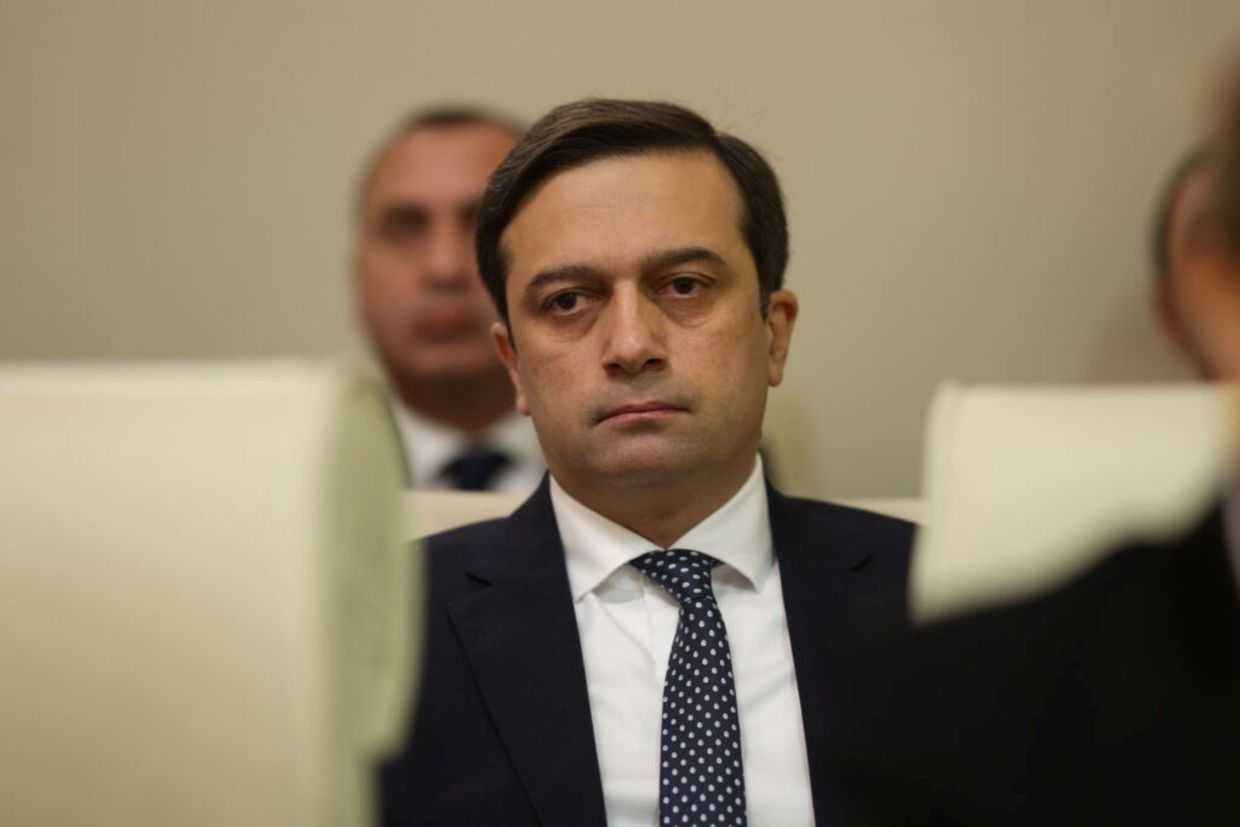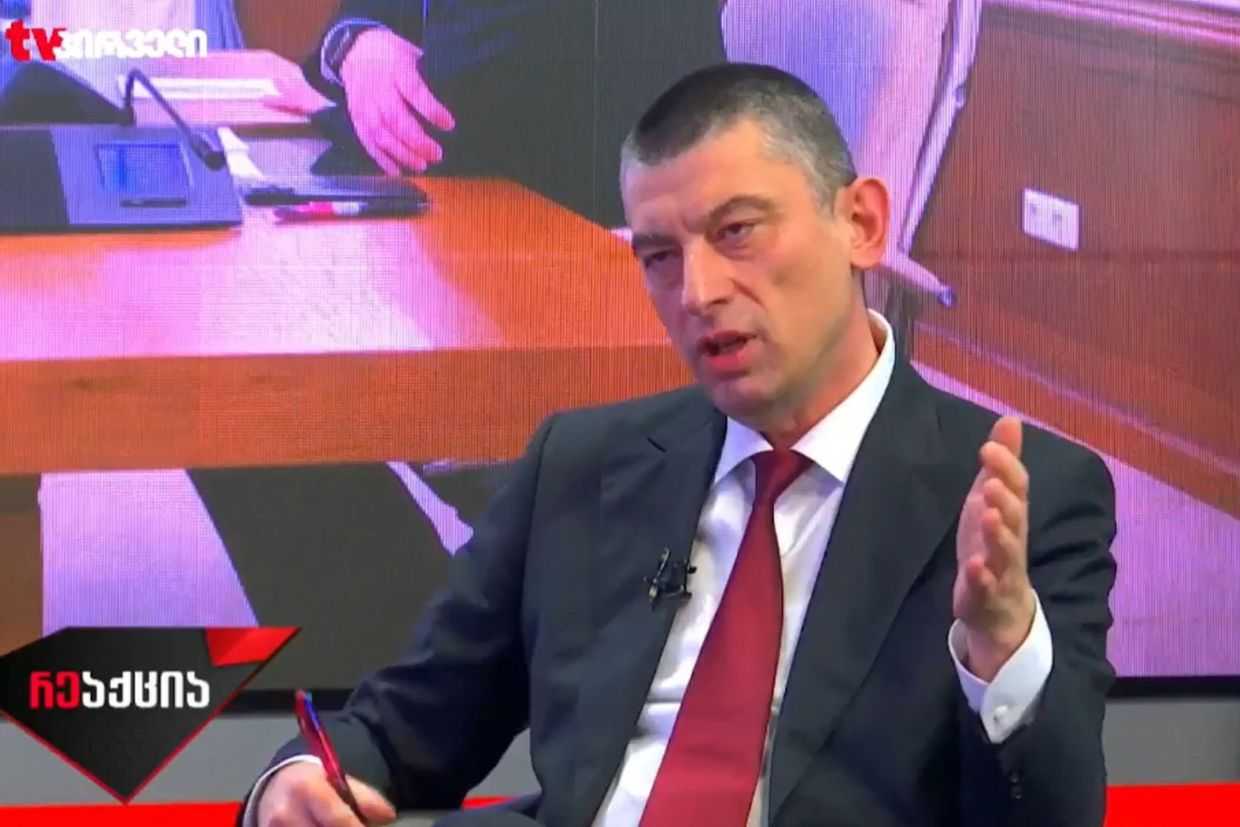‘Whoever will pay more, I will observe for him’: the Georgian parliamentary elections in Iormughanlo

In Iormughanlo, a remote village in eastern Georgia with a majority ethnic Azerbaijani population, Georgia’s parliamentary elections appeared well organised — by the party officials observing it.
It was 09:20 in Iormughanlo and polling station No. 30 in the Keshali village school resembled a buzzing beehive.
In front of the polling station, people discussed how many voters they may bring, about money, and who may help find new voters. Someone tells voters how they should fill in the candidate number correctly
‘I couldn’t find Aunt Sakina’s number’, a middle-aged man tells another while they check what appears to be a list of names.
‘Where can I find her number?’ he asks.
In front of the polling station, another man says that he will bring 50 voters, but that he could not guarantee they would fill out the ballot correctly.
It seems as if everyone gathered is more worried about the results than the actual electoral process.
‘Write my name, I will bring both my daughter and son’
It was not hard to discover that someone had organised who should bring the voters to the polling station and motivate them to vote, the motivation being money.
‘I’m like a blind person. I couldn’t find a gap where I could sign’, said an elderly woman, referring to the voter list. She stood in front of the polling station, looking around for help.
Many elderly women came to the polling station, seemingly with little information about who the candidates were. Instead, they spent their time complaining about their health conditions.
‘I brought a voter, who should I see here?’, said a man outside the polling station.
The people bringing voters to the electoral precincts were determined by gender — women were responsible for women, and men for men. Once they reached the polling station, a discussion of money took place.
It was like another version of a wedding ceremony in Kakheti, with the ‘guests’ discussing gifts and even food.
‘At the end, they will serve barbeque’, one man shouted to another, who had come to vote with his wife.
In the chaos of the people outside, voices overlapped each other. Anyone who couldn’t find their name on the voter list in the 30th polling station went to the 31st.
‘I couldn’t find number 1, you said it would be number 1, yes?’ a woman asked her husband from the voting booth. Election representatives laughed while her husband hid his face, answering that they had discussed the number at home.
During the official voting hours from 08:00 to 20:00, some recruiters came again and again with different voters, gaining more contacts throughout the day.
‘Write my name too, I will bring my daughter and son, too’, a man said, sitting with another under a tree.
‘Tell me your code number first’, his companion responded.
Someone inside the polling station also took notice of who brought the voters and how many of them voted. The counting process was continuous, both inside and outside the polling stations, with everyone seemingly having a voter list.
‘Whoever will pay more, I will observe for him’
Inside the 30th polling station, it was crowded, with long queues to vote. Everyone looked like they knew their role well and were simply waiting for their turn in the voter booth.
‘Who is the observer here?’, I enquired upon entering the station.
In response, a man hid his ID card, and answered that ‘whoever will pay more, I will observe for him’.
It was not long before two women entered one voter booth, trying to find the number of a candidate. The head of the polling station separated them, but their ballots were not counted as invalid.
Similar occurrences happened many times, and the head of the polling station tried to intervene on several occasions. At one point, she tried to rip up one of their ballots, but another representative of the Central Election Commission (CEC) did not allow her to do so, arguing that the woman was old and had not received an education.
An explanation for multiple voters in one booth seemed to have been prepared beforehand. ‘It is my first time in the election’, multiple voters stated, an explanation that was supported by both CEC representatives and observers.
The Georgian Dream party representative seems as if he is the owner of the polling station, frequently exiting and entering the station, and at times, calling to someone who appeared to be regulating the voters.
It was easy to identify who was an independent observer, because they were the ones constantly raising their voices and protesting against electoral violations they saw.
At the 30th and 31st polling stations in Iormughanlo, located inside the village school, there was plenty of space for both voters and observers.
Inside and outside of the polling stations, voters were asked for their voter codes. If they could not find themselves, they asked for help, saying that before the election they had not received any announcements about where they were registered and at which place they should vote.
The situation was no different in polling station No. 35 in Lambalo, a village within the Iormughanlo constituency. Here, cars were used to transport women to the polling station where a man told them their voter code while standing near the voter list.

The polling station was very small, and the observers were not able to see the booths or effectively observe the process, even if standing. Time and time again, the observers and CEC representatives argued with each other after observers reported a violation.
By 17:30, only 438 people had voted out of a total of 1,445 voters registered. An hour later, the number of voters had only risen by 30.
Outside of the polling station, men gathered, shouting the voter code of the voter currently in the booth. At the same time, a man waits with a list to help if someone has forgotten their voter code, tearing off the number from his list.
When a journalist asked the man about the list, others defended the man, with one man claiming he was mentally ill. An hour later, this man was seen opening the door of the polling station and telling several voters to shout out their voter codes.
Outside polling station No. 34 was no different from the others, with many men gathered in front, as well as the same man who was previously seen transporting women by car to vote. It was almost impossible to talk to the women voting. There was a nervous scent in the air as time went on.
It was clear that both sides had their own voting and counting processes. Outside, people didn’t have any worries.
At one point, two men, one of whom was a Georgian Dream representative, forced me to show them photos I had taken on my mobile phone. Only after deleting a photo — which showed the men coordinating voters with a voter list — was my phone handed back to me, the man calmly stating that it was not right to shoot his face. He then stated that they were doing ‘good work’, claiming that the women they coordinated were ‘uneducated’ and that they needed to ‘learn their voter codes’.
A voter can find their voter code and the polling station at which they are supposed to vote in three ways: from an official announcement, by looking up their ID number on the CEC website, or by looking at the list of voters which was published and posted at each polling station the day before the elections.
Like polling station No. 34, it was very quiet here. By 17:00, the total number of voters was 425 out of a total of 1,462.
By the time polls closed at polling station No. 34, there were 23 ballots marked as invalid.
After the results were announced, an observer from the opposition Unity National Movement party went to the entrance of the polling station and shouted, ‘I collected 112 votes for Misha [former president Mikheil Saakashvili] without any money, look at you’.
The men gathered outside left the yard of the polling station with satisfied looks, already clear of the results.
‘They took their money before the election’
According to Tozu Gulmammadli, an ethnic Azerbaijani activist in Georgia who checked each polling station around Iormughanlo on election day, Georgian Dream had ‘found out that they would lose the election, which is why they chose to focus on regions where, for them, it was easy to win the election with money’.
‘Iormughanlo residents did not know Georgian Dream candidates either, because the ruling party did not campaign before the election’, Gulmammadli told OC Media.
‘Generally, our people didn’t understand which election was held and who was elected. Even now they ask me who was elected to the presidency’, she added.
Gulmammadli noted that clarifying how much money was spent per vote was complicated because it differed based on the polling station and how difficult it was to collect the voters.
‘Some voters were paid ₾50 ($18) or ₾100 ($37) — these voters were those who voluntarily went to the polling station and wanted to vote. The majority of these voters were from the opposition’, she said, noting that a Georgian Dream observer at the 28th polling station had asked why she only complained to them about violations when the UNM also paid money. However, she said that she had not seen this herself.
Instead, Gulmammadli emphasised that another group of voters was organised ahead of the election and their votes planned.
According to her, within this group ‘many of them teachers and heads of schools’, money was distributed ahead of the election. When they arrived at the polling station on election day, there was a person who checked who brought the voter, as this ‘coordinator’ would be paid based on how many voters they brought.
‘I guess these voters were paid much more than money. Some of them were promised land and some of them were promised different positions of employment because in such kinds of falsifications, the amount of money couldn’t be more than ₾100 ($37) or ₾200 ($73)’, Gulmammadli told OC Media.
She added that another promise was made to voters who had relatives who were imprisoned. In this case, the voters were promised that their relatives would be added to the Amnesty Act.
According to Gulmammadli, it is not possible to check in the registry about who was promised land, as such documentation will only become available several months after the elections.







